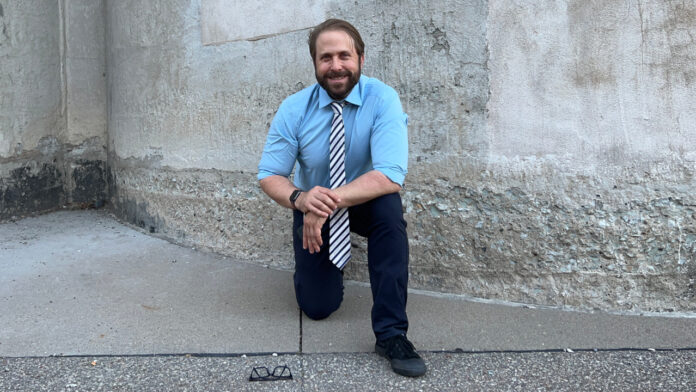
As a native of the Chicago suburb of Matteson, Illinois, Dr. Keith Taylor said it seemed community-based economic developments were always top of mind for local leaders.
“Ever since I was a kid, economic development has always been a topic of conversation in the community,” Mr. Taylor said. “It’s always been of interest to me to see what people view as impactful economic development that benefits the community.”
That community-based background was fundamental to the career of Mr. Taylor, an assistant specialist in community economic development at the University of California-Davis, who was one of the keynote speakers at the Sustainable Economy & Transportation Conference held May 24-25 at the Cedar Rapids Public Library. The event, co-sponsored by the City of Cedar Rapids, Alliant Energy and the Cedar Rapids Metro Economic Alliance, focused on sustainable economy and transportation opportunities and solutions.
In Mr. Taylor’s estimation, economic development efforts in communities nationwide, including in the Corridor, are often informed by government bureaucrats and larger corporate leaders, but such a strategy often overlooks key opportunities that can drive more sustainable ongoing growth.
“It’s not a bad thing for us to try to get factories or warehouses or corporate headquarters to our communities,” he said. “If you can do that, great. But too many of our communities rely on policies that focus on that alone. That means we leave out all kinds of really interesting alternative business arrangements. We don’t help out small and medium enterprises, and we become dependent on larger systems. We think there’s more bang for the buck going for the big fish, and we think the small fish [are] a waste of our time.
“I would argue,” Mr. Taylor added, “that a big part of the reason why small and medium enterprise looks more difficult is because we’ve put so much time into large enterprise. If we’d start having a coordinated strategy around small and medium, it wouldn’t be as difficult. The time is overdue.”
Mr. Taylor acknowledged that political gridlock at the state and federal levels often stymies the development of government policies that could fuel true economic development. Those policies tend to focus on large corporations, to the detriment of small to medium businesses (SBMs).
“In fact, there’s a lot of things that we can do that gives our communities power to do what I call scaling local,” Dr. Taylor said. “When it comes to small and medium enterprises, if our independent businesses think that they can just compete against the big guys like Amazon and not work together, they’re very misguided.”
Dr. Taylor said his first strategy is encouraging SMBs to develop buying groups and purchasing cooperatives, similar to those employed by companies like Ace Hardware or Carpet One.
“They are part of multi-billion dollar purchasing cooperatives that people think are franchises,” Dr. Taylor said. “And they do have many features of franchises. But as opposed to the franchises being shareholder-owned and they tell you what to do, they’re actually small business owners and you tell the franchise what to do on your behalf. So it would be very easy to start connecting small and medium businesses to the purchasing co-op and buying sectors.”
A second strategy, Dr. Taylor said, involves local leaders in government, health care and other key economic sectors rethinking their procurement practices to focus on community wealth-building, rather than contracting with multinational suppliers. “Figure out how we can spend our dollars locally,” he said. “There’s no reason why we need to go to Marriott Sodexo for local food needs. They’re going to do just fine in the open market. This isn’t an unfair advantage by any means. In fact, it’s just about putting things on parity in many ways.”
And a third option, Mr. Taylor said, is for local businesses to develop succession and conversion plans to ensure future viability, converting them from traditional private ownership to a mix of employee stock ownership plans (ESOPs) and worker or consumer cooperatives
“A lot of folks look at these models cynically and say, ‘Oh, these are hippie dippie, fly by night kind of businesses.’ Not true,” he said. “These are very rigid, rigorous, robust businesses with a long history. Amazon’s doing some really interesting things, but we also need something to curb the power of Amazon, while also making sure small businesses can compete against them.”
Mr. Taylor stressed there’s no singular blueprint for sustainable, community-based economic development.
“My cautionary note is we should not be waiting for the federal or state government to inject fairness for the economy,” he said. “We want that and we need that. But we need to be building some form of collective economic power. This is not some sort of grand ideological idea. It’s fundamental to how we function in democracy.”
Those efforts, Mr. Taylor said, provide reason for optimism in economic development despite recent trends.
“Instead of listening to all the naysayers that give us all the reasons why things are terrible, we need to look at the appreciative examples, the areas where positive changes happen in our economy and our society,” he said. “We latch on to it, we take one example and build on it. With each success, we get more of that self-esteem that drives us forward, and that’s where the inspiration comes, through these actual proofs of concept that show we can do it.”




